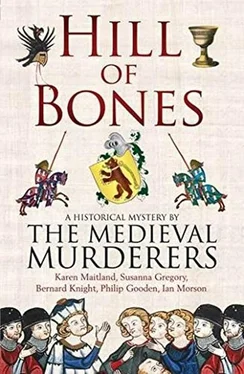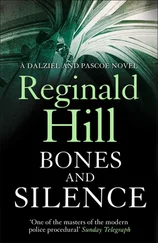But that wasn’t the end of it, of course. Did you think it would be?
The play we were performing on our last night at the Bear Inn was A Fair Day . This is a comedy about a summer fair, as the title suggests. Set on the outskirts of London – although I don’t think the city is ever named – it shows a world populated by good-hearted or venal stall-holders, cutpurses, gamesters, fortune-tellers and the like. There are confidence tricksters too, of course, the ones who sell little bottles containing the elixir of life or the infallible prescription for turning base metal into gold, once you have parted with your money. And then there are the visitors to the fair. All these characters are thrown together and left to simmer like the ingredients of a stew until the flavour is rich and rare.
I was playing the part of a justice of the peace, Mr Justice Righthead, who stalks the fairground looking for breaches of the law in between announcing his determination to close the whole thing down. The idea had already occurred to me that I could slip one or two touches into my performance that hinted at a certain Bath gentleman. I padded myself out around the middle and practised wagging my forefinger and emphasising my Somerset burr. It was a joke that would only be appreciated by Abel and Laurence, and perhaps one or two of the audience who might be reminded of Mr John Maltravers. It was also a way of exacting a further little revenge on the merchant. There could be no adverse consequences, surely, since we were quitting the town the next day.
Shortly before we were due to go on, Abel said to me, ‘They’re here.’
‘Who’s here?’
‘The men on the hill today. Mr Maltravers and whatsisname, Rowley. They’re sitting in the audience.’
‘You’re certain?’
‘See for yourself.’
I peered through a gap in the tattered hangings that concealed the tiring-room to the side of the stage. On a bench only a few yards away squatted the portly merchant and his servant. They looked disgruntled and battered after the day’s experiences. Furthermore, sitting near to them were two other gents I knew: Edward Downey, the lawyer, and Dr Price. These two wore expressions that indicated they might actually be looking forward to the evening’s entertainment. Also on the benches were the cousins, Kate and William Hawkins. Then, casting my eyes further back towards the individuals standing behind the benches, I noticed the two members of the night watch. I remembered that I’d urged them to attend this evening. But it also came to me that they might be here in some official capacity, perhaps to do the bidding of John Maltravers. I had to remind myself that it was Maltravers and Rowley who had done wrong, who stole Christopher’s notebook and assaulted the Hawkinses.
‘Why is he here?’ said Abel.
By now Laurence Savage was also taking a peek through the hangings. He said to me, ‘I thought you said this Maltravers hates plays.’
‘So he does.’
‘Do you think they recognised us this morning? Do you think they knew us for players?’ said Abel.
I shrugged. ‘So what if they did? We are here under licence. They can do no harm.’
‘Who can do no harm?’
This was John Sincklo speaking, the senior member of the King’s Men on our tour. He had caught the last words of our anxious conversation. A serious individual, John Sincklo would not approve of anything that I and the others had been doing that day away from the stage. So we made light of our comments and readied ourselves for the final performance in Bath.
All was going well with A Fair Day , or so it seemed. The audience enjoyed our antics as stall-holders, con men, customers. There is not much of a plot to the play but there is a lot of coming and going and confusion of identities and a good measure of bawdiness mixed with finely crafted insults. Among all this, I strode as Mr Justice Righthead, denouncing the pleasures of ordinary folk and trying to put a stop to them. I quickly forgot about the presence of John Maltravers and George Rowley in the audience, carried away with my windy proclamations and buoyed up by the laughter in the inn yard.
Trouble did not start until quite near the end of the action. In my part as Justice Righthead, I had just received my comeuppance. Among the visitors to our fictional fair were an innocent young man and a comely young woman. I had taken both under my wing, especially the woman, upon whom I had designs. Now this pair were exposed as a notorious cutpurse and his wench. So Mr Justice Righthead was in his turn exposed as both a fool and a hypocrite, when the woman gleefully described his clumsy attempts to seduce her. Instead of hanging my head in shame, I launched on a fresh tirade. Attack is the best defence. I was in full flow when I became aware of a disturbance among the audience. The weighty figure of John Maltravers lumbered to his feet and, wagging his finger in the style that I’d been imitating on stage, started his own rant.
I won’t bore you with the details of what he said. Plays were a disgrace, players were a blot upon the commonwealth, authority was being undermined, we should be whipped for our pains, et cetera. This was so much an echo of the lines that I was delivering that at first people might have believed Maltravers’ words were all part of the action. But some among the audience recognised him and, pretty soon, everyone was able to distinguish between play-acting and the real thing. Curiously, he did not sound as convincing as an actor would have done. Edward Downey and Dr Price made ineffectual attempts to hold him back but he waddled to the edge of the raised stage and continued his harangue.
Now we of the King’s Men are used to dealing with interruptions. Usually they come from drunks, occasionally from mischief-makers. They tend to be short-lived. This Maltravers man went on and on. He was genuinely angry, working himself up further with every spluttered sentence. His round face turned a dark red and his finger waggled ever more furiously. The audience were reduced to mutters, interspersed with a bit of booing and some laughter. They might not have been entertained as we’d been entertaining them, but they could not take their eyes off the merchant. I’d stopped speaking some time ago since there was no point in continuing with my own rant. My fellows were all on stage, for it was the climax of the action. We formed a ragged semi-circle staring at our attacker, waiting for him to exhaust himself. John Sincklo looked outraged, since there is nothing to rouse the ire of a player like an attack on his profession.
Then I noticed that George Rowley was nowhere to be seen. The stocky servant was not sitting on the bench, nor could I spot him in the gathering gloom of the inn yard. Some instinct caused me to glance sideways at the little curtained-off tire-room where our costume baskets and other effects were stored. I broke away from the group and within a few strides had reached the side of the stage.
Inside the tire-room everything was in a state of disorder. Costumes, props were tumbled out of the baskets. Among the pile was a frantically rummaging Rowley. I could guess what he was looking for. Instantly I realised that John Maltravers’ intervention in our play was planned. Oh, he meant every one of the words he was still booming out in condemnation of the players. He’d love to see us whipped, run out of town and the rest of it. But he was acting too. It was a diversion to keep all eyes in the audience fixed on him and to give his man a chance to sneak into the tire-room and ransack our property. Undoubtedly, Maltravers had realised the identity of his ambushers on Solsbury Hill this morning, had seen us retrieve the black book, and, driven by fury, was determined to get it back. It was a desperate scheme, guaranteed to make an exhibition in front of his fellow citizens. But perhaps he did not care.
Читать дальше












